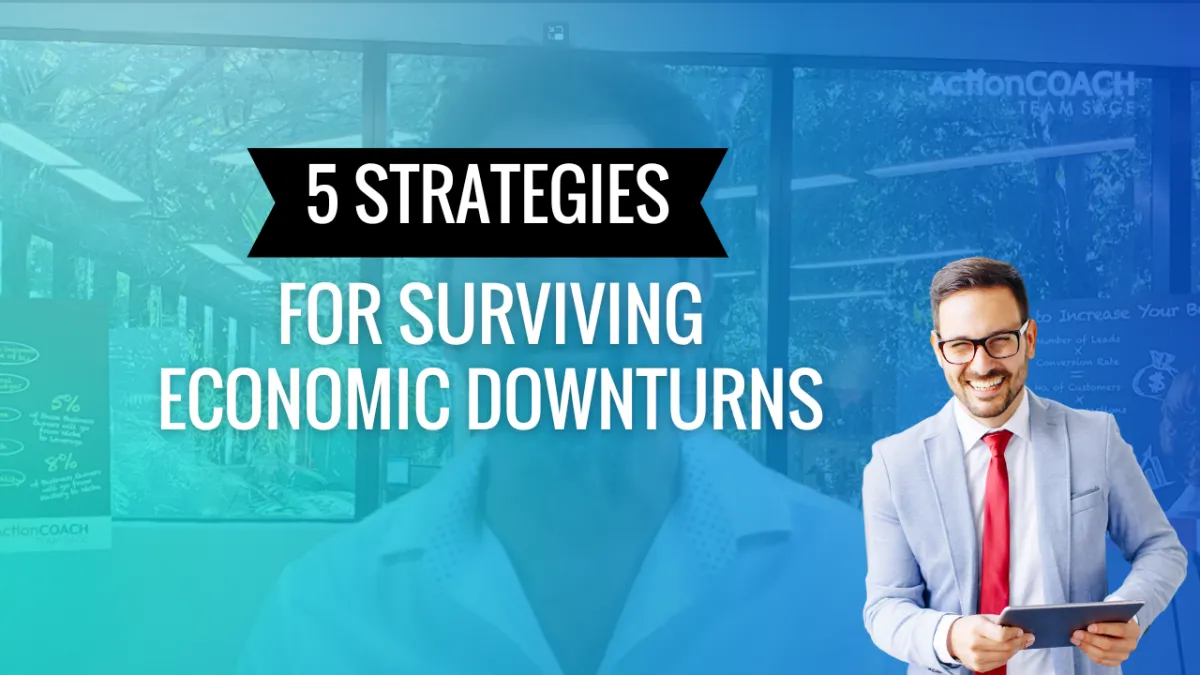
5 Strategies for Surviving Economic Downturns
Are you a hardworking local small business owner looking for ways to survive economic downturns and keep your business profitable? Look no further!
I'm here to share with you five strategies for surviving economic downturns and keeping your small business profitable, such as focusing on long-term sustainability and staying on top of your cash flow. Stay tuned! Hey everyone. Doug here, and I'm here to talk about something that affects us all - economic downturns.
As a local small business owner, it's important that you have strategies in place to protect yourself from any economic downturns. It can be a scary time, but you don't have to face it alone. Today, I'm going to share with you five strategies for surviving economic downturns and keeping your small business profitable. And at the end of this video, I'll tell you about another great opportunity for more free training on how to recession-proof your business.
First, don't just focus on the short-term. As a small business, it's easy to look at short-term profits, but you must also focus on long-term sustainability. When focusing on long-term sustainability, it's important to plan for the future. Consider market trends and look for ways to innovate and stay competitive in the long run. Think about how you can diversify your product or service offerings to cater to different customer needs.
It's also important to keep an eye out for new opportunities and and invest in them even if they seem risky Initially. You should also consider forming strategic partnerships with other businesses that can help you expand your reach or boost profits. Taking a proactive approach to managing your finances is key; Analyze your current financial situation and explore various options to reduce unnecessary expenses and improve cash flow.
Take advantage of tax deductions when available. Invest in marketing strategies that will bring the greatest returns, and prioritize technologies that will streamline business operations. Finally, don't forget about customer relationships! Invest in building relationships with existing customers by providing excellent customer service and incentives for loyalty. Create brand awareness through social media campaigns and other advertising channels, and actively seek out feedback from customers about their experiences so that you can make improvements where necessary.
Second, look for new opportunities. Don't be afraid to take risks and explore new business opportunities. We're all in this together and you can be part of the solution. When looking for new opportunities, it's important to think outside the box. You should explore new ways of doing things that will help your business stand out from the competition. Consider how you can use technology to automate repetitive tasks and become more efficient.
Think about how you can can use your resources to offer a unique service or product that solves a problem in your field and provides value for customers. Investing in research and development is key as well when it comes to creating new products or services that are innovative and successful. Take advantage of current trends in the market by researching what people are looking for and seeing how you can adapt existing products or services to meet their needs.
Keep an eye out for potential threats or competitors that could put your business at risk, and strategize ways to stay ahead of them. Finally, keep track of customer feedback and analyze data so that you can identify areas of improvement and develop plans for growth based on what customers want from businesses like yours. Investing in customer relationship management (CRM) software can be extremely helpful here, too, since it allows you to capture customer data quickly and easily while also giving you insight into customer behavior.
Third, diversify your income streams. Don't rely too much on any one income source. Spread your risk across multiple revenue streams to keep your business afloat. Revenue diversification is a smart move for any small business owner who wants to ensure their business can weather economic storms.
It's important to diversify your income sources so that you're not relying too heavily on any single source. This way, if one revenue stream dries up, you still have other options to keep your business profitable. One way to diversify your revenue streams is by offering different product or service packages. You can create several packages that cater to customers of different budgets and needs.
Doing this allows you to capture a larger share of the market and increase your overall profits without relying on any single revenue stream for too much of your income. Another approach is to look for new markets and explore ways to expand your reach beyond traditional channels. For example, look into selling products online or creating an e-commerce store if you don't already have one. You can also explore different types of advertising campaigns that can help you reach potential customers outside of your local area or even internationally.
Additionally, consider using subscription-based services as a way to generate recurring income from existing customers rather than just relying on on- time sales. This could include offering monthly membership plans or setting up subscription boxes for customers who want regular deliveries of certain products at discounted rates. Finally, look into different types of financing options such as loans, grants, and investments in order to raise more capital without having to rely too heavily on personal savings or debt financing.
Having multiple sources of capital may allow you to more flexibility when it comes time to expansion products and taking risks with new ventures. Fourth, stay on top of your cashflow. Keep a close eye on your cashflow and look for ways to reduce costs. Cash flow is an important factor in the success of any business, and managing it effectively during times of recession can be a major challenge.
To keep your cashflow positive, you should take steps to reduce unnecessary costs wherever possible. Make sure that you are keeping track of all your expenses and in invoices so that you know exactly where your money is going. Look for ways to cut back on overhead costs like rent or utilities, and prioritize essential expenses over optional ones. You should also explore alternative sources of financing, such as government grants or loans if available.
Additionally, consider working with vendors to negotiate better payment terms or discounts on services or products, as well as negotiating with customers who may be willing to pay early for discounts or incentives. It's also important to think about cash flow from a longer term perspective when planning for future investments and expansions. Make sure that any investments you make will help generate a positive return rather than draining resources from other areas of the business.
This includes exploring how new technology can help streamline operations and reduced costs while also improving efficiency. Finally, don't forget about inventory management! Keeping track of what supplies you have on hand and ordering just the right amount can help avoid unnecessary losses due to excess stocks sitting around, taking up valuable space or depreciating in value over time. And lastly, look for ways to help your customers.
Providing exceptional customer service and looking for ways to help them succeed can be a great way to recession-proof your local small business. Developing a strong relationship with your customers through personalized experiences, active listening and timely follow-up is key to building loyalty and trust. This will make customers more likely to stick with you even during difficult times. In addition, offering incentives or discounts can also help keep customers engaged and encourage more purchases.
You could offer discounts for repeat customers or create loyalty programs that reward customers with points that can be redeemed for products or services. Additionally, consider providing free shipping for orders over a certain amount or offering customers the option to purchase items in bulk at discounted prices. It's a good idea to focus on creating targeted promotions and campaigns that speak directly to the needs of your target audience.
This could include sending out special offers during certain holidays or developing email marketing campaigns that provide helpful content related to relevant topics like budgeting tips or money-saving strategies. Finally, make sure that all of your communication channels are effective and up-to-date. Ensure that all customer inquiries are answered quickly and accurately, and invest in customer service training so that your employees are well-equipped to handle any situation with professionalism and empathy.
So these are five strategies, but I'm feeling generous today. Would it be okay with you if I over-deliver and give you some more? Yeah, Great! And remember, at the end, I'm going to tell you about our free training on the three dangerous pitfalls that keep small business overs overwhelmed, putting out fires, and chain to your business. There is even a surprise gift at the end of that training!
But first, let's get to my bonus strategies! Sixth, keep up with the latest technology and trends. Make sure your business is staying ahead of the curve by investing in the latest technologies and keeping an eye on industry trends. Doing this will allow you to remain competitive and ensure that you are providing the best possible customer experience to stay ahead of your competition.
Technology can be a great asset when it comes to running a business as it helps streamline processes, increases efficiency and lowers costs. Investing in technology such as cloud-based solutions for customer service, web analytics tools, or automating accounting systems can help make operations more efficient while also reducing overhead costs. In addition, staying informed about industry trends can help you identify new opportunities or threats that may affect your business.
This could include tracking changes in customer spending habits or market conditions so that you can be prepared for any upcoming changes or shifts in the economy. Additionally, explore different types of partnerships or collaborations that could open up new markets or increase brand awareness.
Finally, make sure you are taking advantage of digital marketing opportunities such as social media campaigns, search engine optimization, (SEO) techniques, content marketing strategies, and email marketing campaigns to stay visible online and reach potential customers around the world. Seventh, think outside the box and consider new ideas. Don't be afraid to get creative and come up with new ways of doing things that could help your business succeed in spite of any economic downturns. This means exploring options beyond traditional methods and trying out new strategies that may help you stay afloat during difficult times.
For example, consider how you can diversify your product or service offerings to capture more customers or tap into untapped markets. This could include introducing new products or services or developing partnerships with other businesses to offer a wider range of goods or services. Additionally, explore different pricing models such as subscription-based services, tiered pricing plans, or pay-what-you-can options to give customers more flexibility When it comes to making purchases.
You should also look for ways to make operations more efficient so that you can reduce costs while still providing an excellent customer experience. This could include streamlining processes through automation, delegating tasks wherever possible, or outsourcing certain tasks to freelancers or contractors who specialize in those areas. To further improve efficiency, consider adopting cloud-based solutions such as customer relationship management, (CRM) systems, or project management tools.
Finally, take the time to conduct market research and analyze consumer behavior so that you can better understand what customers want and how they make buying decisions. This can help you identify opportunities for growth and adjust your strategies accordingly based on current trends and preferences. Taking steps like these will not only help ensure that your business continues to remain competitive in the present, but also position it for success in the future by allowing you to prepare for changing conditions before they arrive.
Eighth, form strategic partnerships with other local businesses. This can help you access new markets and resources that could support your business during a recession. By forming alliances with other small business owners in the community, you can share resources and leverage each other's strengths to help ensure that each business remains successful despite any economic downturns. For example, consider teaming up with another business to co-host events or collaborate on joint marketing initiatives.
You could also look into offering discounts that are redeemable at both of your businesses or developing cross-promotional campaigns where you feature each other's products or services. Doing this will not only increase visibility for your business, but also create more opportunities for customers to find and purchase your goods or services. Additionally, look for ways to combine forces with other local businesses to create unique experiences that attract new customers while keeping existing ones engaged and loyal.
Consider creating shared spaces for pop-up shops, hosting joint classes or workshops, running special promotion campaigns together, or even collaborating on developing new products or services that meet customers needs in innovative ways. Working with other businesses in the community can provide an invaluable stream of support during difficult times and open up more lucrative opportunities throughout the year. Finally, don't forget about the importance of networking and staying connected with other local business owners by attending events such as chamber meetings or industry conferences whenever possible.
This will give you an opportunity to meet people face-to-face who may be able to offer valuable insights, advice, and resources that could help strengthen your business during tough times. Ninth, stay positive and focus on the future. It is always important to remain optimistic and remain focused on the long-term goals during difficult times. This will help you remain resilient in spite of any challenges that may come your way and give you the motivation to keep moving forward.
In addition to staying positive, it is also important to stay informed about current economic conditions so that you can plan ahead and make smart business decisions that will prepare you for whatever lies ahead. Keeping up with the industry news, reading reports from trusted sources, and taking advantage of resources such as the small business administration (SBA) websites can help provide information that can give you an edge even during difficult times.
Finally, don't forget about the importance of investing in yourself and taking care of your mental health during tough times. Make sure that you are taking breaks when needed, getting enough sleep, eating healthy meals, exercising regularly, connecting with friends and family who can provide emotional support, or seeking professional help if necessary. Taking care of yourself first will ensure that you have the energy and clarity of mind needed to make sound decisions that will keep your business successful during difficult times.
Our Tenth, and final strategy, be prepared for the unexpected. Building a resilient business requires being prepared for anything that may arise in the future. As such, it's important to create a plan of action and consider what you would do in case of unexpected events or changes in the market that could potentially affect your business.
This means having an emergency fund set aside just in case of an economic downturn or other financial crisis, establishing clear protocols for quickly reacting to any unexpected situations, and investing in insurance policies that can protect you from risks such as natural disasters or liability issues. Additionally, it's important to assess and understand potential exposures and liabilities that could arise due to the current situation and take steps to mitigate any risks. Furthermore, ensure that your team is aware of any potential risks so that everyone can work together to make sure the business remains resilient if difficult times arise.
Assign roles and responsibilities so that everyone knows exactly what to do in case of any sudden change or disruptions due to external factors. By preparing for the unexpected now while taking proactive steps towards minimizing risk, you'll be better equipped to maintain a healthy business even during turbulent times. These are just a few strategies for surviving economic downturns and keeping your small business profitable.
But there's more to learn. To find out more about recession-proofing your local small business and growing it successfully, make sure to click the link in the description below. It will take you to a web class where you can get more valuable tips and strategies. Plus, I'm offering a free bonus at the end of the web class - The Business SUCCESS Blueprint. It's time to prove to yourself that you can be successful.
So click the link in the description to get started today. As I end this video, I hope you've learned some valuable strategies for recession-proofing your local small business and maintaining growth during difficult times. To help others benefit from your experiences, I encourage you to leave a comment below this video about how these strategies have worked for you and any other tips or advice that you have found helpful.
Your stories could provide invaluable insight and guidance to other entrepreneurs facing similar challenges. Additionally, by sharing your experiences with the community, you can also help build a network of support and resources that can offer continued assistance throughout the year. Everyone in the entrepreneurial space faces different issues at various points in their business journey, so your feedback can act as a beacon of hope for those who are struggling to find solutions during trying times.
So please be sure to share your experiences with us - whether they be good or bad - as it is essential for everyone's success!
Would you like to learn more about recession-proof your business or other topics regarding business success?
Yes!
Great!
I'm Doug Barra. I believe it takes great courage to own a local, small business.
For the last 16 years, I've ensured that business owners like yourself get the time, money, and freedom you deserve.
Thanks for watching.









